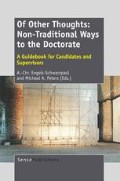Abstract
The doctorate is a critical and highly relevant phase for academic success. It is also a fragile and risky period (Janson et al. 2006: 572). To understand and shape the academic success of non-traditional candidates, one needs to understand the University as a cultural context, an institutional space of socialisation.
Access this chapter
Tax calculation will be finalised at checkout
Purchases are for personal use only
Preview
Unable to display preview. Download preview PDF.
References
Boal, A. (1995). The Rainbow of Desire: The Boal Method of Theatre and Therapy. London: Routledge.
Bourdieu, P. & Passeron, J.-C. (1979). The Inheritors: French Students and their Relation to Culture. Chicago, IL: University of Chicago Press.
Bourdieu, P. & Lamaison, P. (1986) From Rules to Strategies: An Interview with Pierre Bourdieu. Cultural Anthropology 1(1), 110–120.
Bourdieu, P. (1986). ‘The Forms of Capital’ In J. Richardson (Eds.) The Handbook of Theory and Research for the Sociology of Education. New York, NY: Greenwood Press, 241–258.
Bourdieu, P. (1988). Homo Academicus. Stanford, CA: Stanford University Press.
Bourdieu, P. (1989). Social Space and Symbolic Power. Sociological Theory, Vol. 7, No. 1, pp. 14–25.
Bourdieu, P. (1990b). Symbolic Power. In P. Bourdieu (1990) Language and Symbolic Power. Cambridge, UK: Polity Press. (original from 1977).
Bourdieu, P. (1990a). The Logic of Practice. Stanford, CA: Stanford University Press.
Bourdieu, P. (1992). The practice of reflexive sociology (the Paris workshop), in P. Bourdieu & L. J. D. Wacquant, An Invitation to Reflexive Sociology, Chicago, IL: University of Chicago Press.
Bourdieu, P. (1995). The political field, the social science field and the journalistic field. In R. Benson & E. Neveu (Eds.) Bourdieu and the journalistic field. Cambridge, England: Polity Press, 29–47.
Bourdieu, P. (1996). The State Nobility. Elite Schools in the Field of Power. Cambridge, England: Polity Press.
Bourdieu, Pierre (2003) Participant objectivation. Journal of the Royal Anthropological Institute, | 9, 281–294.
Bourdieu, P. (2005). From the King’s House to the Reason of State: A Model of the Genesis of the Bureaucratic Field. In L. Wacquant (Ed.) Pierre Bourdieu and Democratic Politics. Cambridge, England: Polity Press, 9–54.
Bourdieu, P. (2012). Outline of a Theory of Practice. Cambridge, England: Cambridge University Press. (original from 1977).
Brake, A. (2006): Das Sichtbare und das Unsichtbare. Bildungsstrategien als Strategien des Habitus. In: Büchner, P., Brake, A. (Eds.) (2006): Bildungsort Familie. Transmission von Bildung und Kultur im Alltag von Mehrgenerationenfamilien. Wiesbaden, Germany: VS. S. 81–108.
Bunker, B. B. & Alban, B. T. (1996). Large Group Interventions: Engaging the Whole System for Rapid Change. San Francisco, CA: Jossey-Bass.
Cooperrider, D. L. & Avital, M. (Eds.) (2004). Constructive Discourse and Human Organisation. Advances in Appreciative Inquiry, 1. Amsterdam, Netherland: Elsevier.
Elven, J. & Weber, S. M. (2012). Organisation, Habitus und kulturelle Differenz. In M. Göhlich, S. M. Weber & N. Engel (Eds.) Organisation und Interkulturalität. Beiträge der Kommission Organisationspädagogik. Wiesbaden, Germany: VS.
Gomez, M.-L. (2010). A Bourdieusian perspective on strategizing. In D. Golsorkhi et al. (Eds.) The Cambridge Handbook of Strategy as Practice, 141–154.
Janson, K. Schomburg, H. & Teichler, U. (2006). Eher eine “gefühlte” Differenz. Karriereperspektiven von Wissenschaftlern in Deutschland und den USA. Forschung & Lehre 13(10), 571–573.
Lareau, A. (2003). Unequal childhoods. Class, Race, and Family Life. Berkeley, CA: University of California Press.
Mannheim, K.(1997). Collected Works of Karl Mannheim, Vol.10: Structures of Thinking. London, England: Routledge.
Maxwell, J (2009). Contesting the culture of the doctoral degree: Candidates’ experiences of three doctoral degrees in the School of Education, RMIT University, PhD Thesis, School of Education, RMIT University. Retrieved from: http://researchbank.rmit.edu.au/eserv/rmit:6738/Maxwell.pdf
Morgan, G. (1986). Images of organisation. Thousand Oaks, CA: Sage.
Scharmer, C. O. (2007). Theory U: Leading from the Future as it Emerges. San Francisco, CA: Berrett-Koehler.
Wacquant, L. (1996): Foreword. In: P. Bourdieu (1996): The State Nobility. Cambridge, England: Polity Press, ix-xxii.
Wacquant, L. (2005). Symbolic Power in the Rule of the „State Nobility“. In L. Wacquant (Eds.) Pierre Bourdieu and Democratic Politics. Cambridge, England: Polity Press, 133–150.
Weber, S. M. (2013): Partizipation und Imagination. In: Weber, Susanne Maria; Göhlich, Michael; Schröer, Andreas; Macha, Hildegard; Fahrenwald; Claudia (Hrsg.): Organisation und Partizipation (pp. 71 – 82) . Beiträge der Kommission Organisationspädagogik. Wiesbaden, Germany. VS.
Weick, K. E. (1976). Educational organisations as loosely coupled systems. Administration Science Quarterly, 21(1), 1–19.
Zumdick, W. (2001). Der Tod hält mich wach. Joseph Beuys-Rudolf Steiner: Grundzüge ihres Denkens. Dornach, Switzerland: Pforte.
Author information
Authors and Affiliations
Editor information
Editors and Affiliations
Rights and permissions
Copyright information
© 2013 Sense Publishers
About this chapter
Cite this chapter
Weber, S.M. (2013). Transforming the Academic Field. In: Engels-Schwarzpaul, A.C., Peters, M.A. (eds) Of Other Thoughts: Non-Traditional Ways to the Doctorate. SensePublishers, Rotterdam. https://doi.org/10.1007/978-94-6209-317-1_14
Download citation
DOI: https://doi.org/10.1007/978-94-6209-317-1_14
Publisher Name: SensePublishers, Rotterdam
Online ISBN: 978-94-6209-317-1
eBook Packages: Humanities, Social Sciences and LawEducation (R0)


